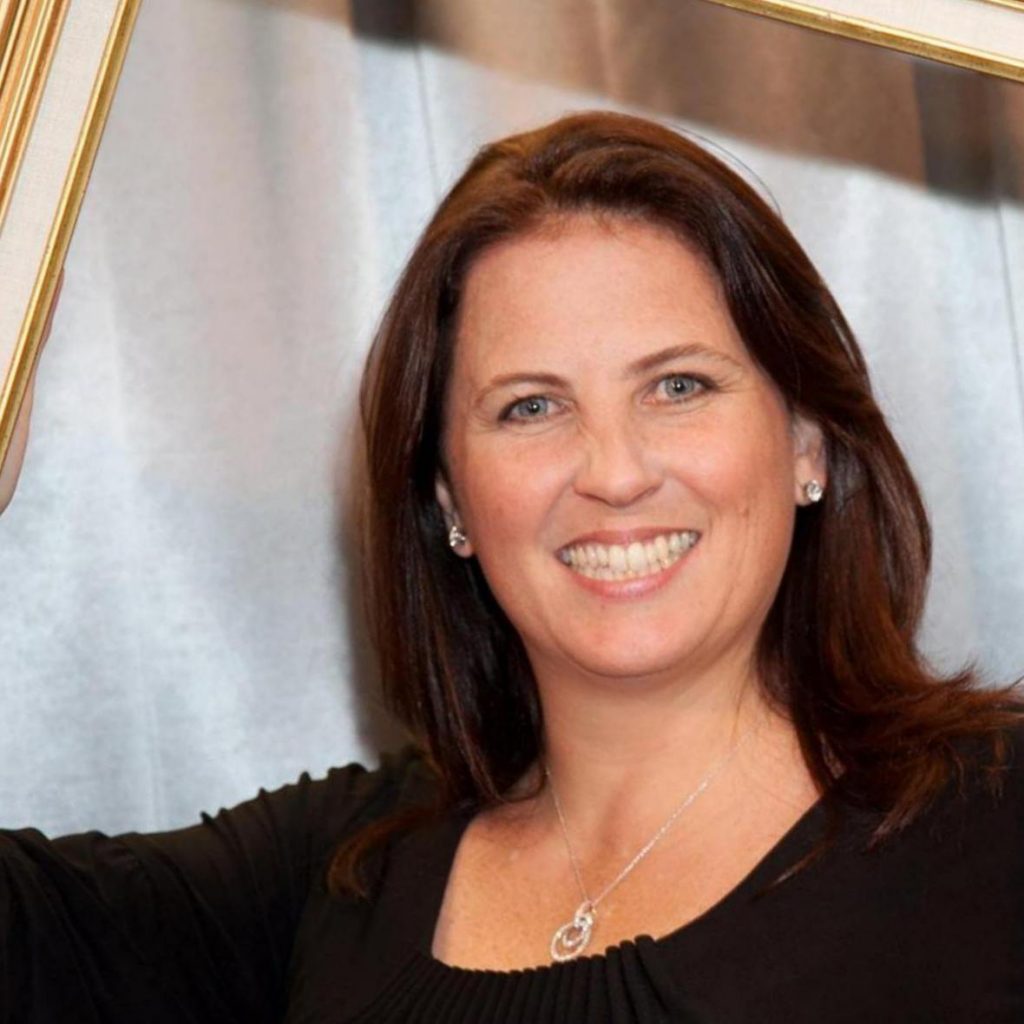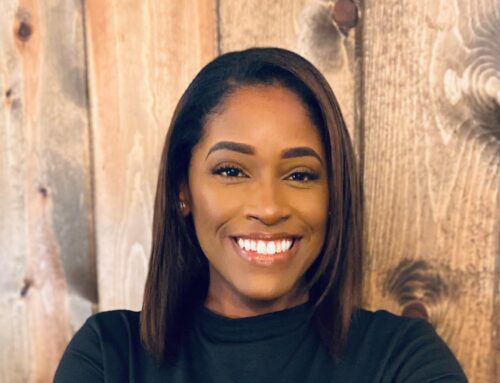Cheryl Dyer is currently the Executive Assistant to the CMO of Sophos, Inc. and has over 30 years of administrative experience, primarily in the tech industry.
In this episode, Cheryl shares tips on working from home which is certainly a hot topic these days. She also talks about the importance of security and what assistants can do to ensure we don’t compromise our executive’s security.
In addition to a great interview episode, Cheryl put together the following remote work best practices to share with us.
BEST PRACTICES FOR WORKING REMOTELY
Have a dedicated work location.
I can’t stress this enough. Previously when I’d work from home for a day, I’d set up shop on the kitchen island. I couldn’t completely focus on work there. There was always something distracting me (e.g. – chores or my husband on his day off). I also couldn’t leave any notes around or they’d get lost in the evening dinner shuffle. It was not working.
Now that I’m working at home full-time, I have a dedicated space that is just for work. I don’t lose sticky notes and can easily stop work and then later, pick up where I left off.
Your dedicated space could be an office, a small desk in a spare bedroom, or even just a corner of the living room. The idea being that the space is dedicated to your work.
Dress for success and leave the house each morning.*
Set your alarm and go through your morning routine just as you would if you were traveling to an office. Then get yourself out of the house for a little bit. For me that means going to the local coffee shop to grab a cup of tea (take out only during the quarantine, of course) or taking my dogs out for playtime. Sometimes I just go for a walk around the block alone. These things help kickstart my day with movement and fresh air. As a bonus, I also don’t end up wearing the same leggings for 4 days straight.
*Don’t forget social distancing, even while in the great outdoors.
Communicate with video/phone calls whenever possible.
Communication is key when working remotely. Everyone on your team should know when you are and are not available, as well as how best to reach you for anything that might be urgent.
I have set an expectation for my team that I will respond to an email within 4-8 hours (even if I don’t have an answer yet). I have also set the expectation for number of emails sent/received before a phone call will happen. If we can’t get resolve something within three emails, then it’s time to pick up the phone or hop on a video call. When there is something urgent, my team knows they can call or text me and I’ll respond almost immediately.
For other non-urgent but potentially lengthy discussions, it’s a good idea to schedule a video call vs. a phone call or an email. The face time enables everyone to feel that personal connection that gets lost when we all work alone remotely all day. Face to face also clears up any confusion that an email alone might cause.
While I love and mostly prefer the email route because I can multitask and prioritize what I respond to and in which order, I feel that there is a time and a place when a video or phone call is necessary to just “get it done already.”
Schedule sanity checks.
Schedule some time with other EAs or co-workers for sanity check-ins. You know, the time that you would sit at lunch together in the past to chat about non-work specific things … yes, that’s what this is about. These check-ins help with relationship building, as well as provide a breather or venting session if that’s what is needed. It’s a time to remember you work with other real live humans and not just with that machine we all stare at.
Regular 1:1s and check-ins with my team (as well as the obvious one with my executive).
My whole team is remote so for me, regular meetings and check ins are key in order to keep us connected and on track with all of the various projects going on at the same time.
Unfortunately, for some these check-ins can easily be put on the back burner. Especially if it’s a weekly plug on the calendar with no specific agenda. In order to make the best of the time with your team or executive, make sure you have sent an agenda so the other party knows exactly what you want to discuss. Sometimes “no agenda” can be interpreted as “not important.”
Work someplace different every once in a while.*
I try to do this every other week or so, either at a café or local coffee shop, or even the golf club. This helps me mentally. The hustle and bustle of folks around me is energizing and keeps me focused on the work at hand vs. some of the things that are beckoning to me at home (laundry, dishes, etc.).
*Unfortunately, this is not possible in today’s landscape where social distancing has become the required norm for the health and safety of everyone. That said, if you have the ability to even just change up where you are working within the confines of your own home, I would still recommend doing this as often as is possible.
Never use public WiFi.
The topic of working from a new location brings me to security. So, you might be wondering how I work from that coffee shop. First, I choose a seat where other patrons do not have easy viewing to my screen. A corner seat is best. Then I make sure to use the Personal Hotspot from my mobile phone instead of the WiFi at the establishment. This way any hackers nearby can’t access my computer or data. Plus, I have Sophos installed so I’m confident that I’m very secure. Please make sure you have up to date security for your computer as well.
Schedule work around your lifestyle (don’t forget self-care!).
This is something I learned fairly recently. I used to log in when I woke up and off at well, you know… when the emails stopped. But I was getting burned out from working non-stop. I then realized one of the huge benefits of working remotely is being able to flex with work and with my family and lifestyle. I don’t NEED to be online 24/7.
So instead, I work my personal needs around the business needs. I schedule time on my calendar to take care of myself (gym, hair salon, lunch with friends). This does mean that I might be working on something for the business at 9pm… but, let’s be honest, in my 9-6, in office world that would happen anyway. With my current setup, I’m able to build out a work/life harmony that I have control over.
—
Thank you, Cheryl, for the great advice!
SPONSOR: SPOONFUL OF COMFORT
Check out this episode’s sponsor Spoonful of Comfort for custom homestyle meals-by-mail that are beautifully packaged and always appreciated. Learn more at spoonfulofcomfort.com/leaderassistant.
LEADERSHIP QUOTE
A leader takes people where they want to go. A great leader takes people where they don’t necessarily want to go, but where they ought to be.
– Rosalynn Carter
CONNECT WITH CHERYL
SUBSCRIBE
Subscribe to The Leader Assistant Podcast so you don’t miss new episodes!
You can find the show on Apple Podcasts, Spotify, Google Podcasts, Pandora, and Stitcher.
Join my email list here if you want to get an email when a new episode goes live.
JOIN THE COMMUNITY
Join the Leader Assistant Slack Community here, or the Facebook Group here for bonus content and to network with other assistants who are committed to becoming leaders!
LEAVE A REVIEW
If you’re enjoying the podcast, please take 2 minutes to rate and review the show on Apple Podcasts here. Each review helps me stay motivated to keep the show going!
—
EPISODE TRANSCRIPT
Cheryl Dyer 0:00
Hi, I’m Cheryl Dyer. Today’s leadership quote comes from Rosalynn Carter. A leader takes people where they want to go. A great leader takes people where they don’t necessarily want to go but where they ought to be.
Podcast Intro 0:15
The Leader Assistant Podcast exists to encourage and challenge assistants to become confident, Game Changing leader assistant.
Podcast Outro 0:26
Hi, it’s episode 53. In US your host, my dad.
Jeremy Burrows 0:34
Hey friends, welcome to The Leader Assistant Podcast with my friend Cheryl Dyer. She works remotely and is going to share some tips on remote working and also security. She works in the security industry. So stay tuned for some great tips. But first, I wanted to tell you about my sponsor for this episode. spoonful of comfort is a unique way to nourish customer and employee relationships with care packages customized with sensational soups, classic cookies and accessories. You can make a big impression for any occasion. I also like spoonful of confer in these times when many employees and companies are going to remote work, which can be lonely for those especially extroverted people in our in our companies that really like being around people really get energy from being around people. Now they’re stuck at home, possibly quarantined with all the Coronavirus stuff going on. And remote work is kind of all over the news. And a lot of people are being forced to work remotely. So what I love about spoonful of comfort is you can send custom homestyle meals by mail that are beautifully packaged and always appreciated. So my idea for you would be if you know a co worker is working remotely or you know a friend is working remotely. Who knows how long they’re going to have to do that. Maybe they don’t even have an office at home, maybe they have to throw a desk in their living room or they have to work from the dining room table. It can be a challenge and also can be isolated and lonely. So I would just encourage you to go to spoonfulofcomfort.com/leaderAssistant, you can go on their order, ship, some cookies and soups, accessories or if you have somebody that’s having a baby and they had to cancel their baby shower because the town’s on lockdown with the virus going on my friends at spoonful of comfort, have a really unique way to connect with and encourage people who may be stuck at home during the season. So spoonfulofcomfort.com/leaderassistant, check them out. Try sending a package to a friend that’s working from home or it just can’t get out right now. And I think it’d be very well received and give you a way to simply be generous to those in your world. Alright, let’s jump into this interview. Hey, everyone. Thanks for tuning into The Leader Assistant Podcast. It’s your host Jeremy Burrows. And today I’m speaking with Cheryl Dyer from Sophos. How are we doing Cheryl?
Cheryl Dyer 3:19
I’m great. How are you doing tonight?
Jeremy Burrows 3:20
I’m doing good. Where are you in the world today?
Cheryl Dyer 3:23
I am in southern New Jersey, right outside of Philadelphia.
Jeremy Burrows 3:29
Awesome. Well, it’s probably similar temperature there than right now than it is here in Missouri.
Cheryl Dyer 3:36
Well, I don’t know what’s out there. And in Missouri, chili, chili. I think we saw our first frost yesterday morning. But yeah, it’s actually been somewhat nice in the daytime and getting cold at night for sure.
Jeremy Burrows 3:50
Yeah. Awesome. Well, let’s talk about your very first job. What? What did you do maybe coming right out of high school? And what skills did you learn in that role that you still use today?
Cheryl Dyer 4:03
Sure. Well, my first job is actually well before high school, I had three of them before I got out of high school. When I was around 10, or 11, I was the first female newspaper delivery person in our town. But at the same time, I was assisting my mom with her Avon Products, selling those to friends and neighbors. And then also working as a cashier at a local supermarket. Awesome. Little busy girl.
Jeremy Burrows 4:30
Awesome. So I used to do paper outs too. And one thing I learned from paper routes is kind of the art of efficiency.
Cheryl Dyer 4:40
That’s exactly what I was going to talk about.
Jeremy Burrows 4:43
Yeah. So, you know, you have to figure out what route is you got to figure Okay, I gotta get these dang papers delivered as soon as I possibly can. What’s the shortest way to do that?
Cheryl Dyer 4:55
Exactly. Yeah, you start your customer list and determine the route even before you start going door to door. I actually, quote borrowed a shopping cart from a local supermarket, use those, so I didn’t have to carry them on my back. Got in trouble for that.
But yeah, so I learned that efficiency definitely matters either in, you know, putting those things in order or by organizing my mom’s Avon products as they came in, I would sort them into the appropriate category so that she could easily pull in and supply her customer orders to them.
Jeremy Burrows 5:38
So when did you kind of make the transition to an EA? Or did you start off your career as an assistant? Yeah, I pretty
Cheryl Dyer 5:47
much started. As an assistant, I was very young. And of course, I didn’t really go looking specifically to be an assistant straight out. But when I was young, I started out as a receptionist. I saw an ad for a receptionist at a local bank in the newspaper and my job, I had zero skills at that age, I was really just looking to get paid somewhere, somehow. But I applied and luckily was able to get that job. I did that job well enough to get myself promoted pretty quickly within the role moved into at that point of formal assistant role elsewhere in the company. got promoted shortly thereafter, once again, what I realized is that with each position, I would take on each task, do it well enough to make an impact. People would notice, I noticed that they had noticed. And so with each role, I would just work quietly, I would do the job, I would do it a little bit better than the person before me. And that’s, that is basically how I sort of propelled the career forward. Although at the time, I would say that I didn’t consider it a career at the time. To me, it was just a job, I knew that college was never going to be in the cards for me. And so instead, I took the route of using all of the internal resources and training that were offered to me, I listened to as many mentors as possible while working basically, can I say this working my ass off, it is a pocket your podcast, so I can say that, right? But yeah, well working my ass off. And again, at that time of my life, it was just about the money, the more the harder that I worked, the more money that I would make. And so what I learned is, in order to get more money, I just needed to continuously do the job better and more efficiently than the one before and just keep doing that over and over again. As I continue to advance throughout, you know, that my the roll in to, you know, assistant, and then Senior Assistant, and then eventually executive assistant. It wasn’t actually until after I had been married and I was on more stable ground that I really started to think about what I was doing it for my job. And I had never really done much soul searching prior to that. But after a lot of self reflection during those days, and I did try out other roles, doing some marketing assistant roles and some tech support roles. But what I learned is that I actually really love doing the assistant role. And it was sort of around then when I decided that this is a career and this is what my career is going to be. And it was then that I made the conscious decision to sort of move forward in educating myself better so that I could do this role as an executive assistant better and really grow as a career executive assistant. Yeah, that’s great. That’s where I got to.
Jeremy Burrows 9:06
Why do you love the role?
Cheryl Dyer 9:09
You know, there’s so many different reasons, I feel that, you know, there’s no formal education for being an executive assistant when you’re in college. So I don’t, I feel that what’s great is with executive assistant that with assistance in general, we are not necessarily experts at any one particular thing. But instead, we are really great at a multitude of things. And that’s what this role is really it could be, you know, running in organizing staff meetings one day and planning off sites another day. Each task has a multitude of things in it that you need to be really good at. And I just think that the variety of that and really juggling all of those different things really, for me is at least what makes the role exciting and keeps them coming back.
Jeremy Burrows 10:10
Awesome. There’s a, there’s a book called range by David Epstein Epstein. I’m sure if I’m pronouncing it right, but his subtitle is why generalists triumph in a specialized world. And so just what you just said about, you know, EAS being not maybe not necessarily specialists in one thing are really, really, really, you know, experts in one area, but can kind of cover a broad range of things. Just made me think of that book. Very, very interesting. I think. I haven’t actually read it yet. I just interviewed a guy that had interviewed him. And so it’s like, wow, this is interesting subtitle. And so I started looking at is like, I think this is kind of how yeas are. So maybe that’s why yeas are awesome.
Cheryl Dyer 11:01
I’m not gonna agree with that.
Jeremy Burrows 11:05
So what’s one productivity hack that you can’t live without?
Cheryl Dyer 11:10
Oh, boy. Honestly, I’m so old school that I can’t live without my Outlook I can’t live without, I don’t have any other tools or apps or whatnot. For my for my task lists, it’s either going to be sticky notes on my monitor, but mostly I sort of lay out my tasks right in my calendar. And it makes it easy to just sort of move them to later in the day or to the next day as needed. And I just let them sit when they’re completed I mark of a different color, and they just roll and then I can always look back and see what I did on a particular day.
Jeremy Burrows 11:47
Can you share a mistake that you made as an assistant, and what you learned from that mistake? Oh, God, just one. You’ve only made one, right?
Cheryl Dyer 11:57
Or totally only made one. Oh, gosh, I’m gonna pull from some archives on this one, so that nobody can identify where that happened. But early on, in my career as an executive assistant, I think it was my very first executive assistant position. Actually, I had to get my boss from Boston to San Francisco. And I did that, except I really didn’t pay very close attention to the details in between Boston and San Francisco. And in during one of his layovers, he had called me and said, Do you realize where you have sent me, and apparently, my connecting flights where it basically went from Boston to somewhere in Canada, to Florida, then to San Francisco. details really matter. And somehow I didn’t get fired, he was actually very kind, and allowed me that one big mistake. And let me tell you, I certainly pay attention to those details today.
Jeremy Burrows 13:08
Details, details, details. So if you had a day where you could go and do anything in the world with unlimited resources, what would you do? And where would you go?
Cheryl Dyer 13:19
I love that question. I’m sad that it’s only one day because I can imagine, honestly, it wouldn’t be work related. I would find myself on some island somewhere and I would explore what it has to offer. And do you know live the culture that is on that island?
Jeremy Burrows 13:39
Awesome. And then you could do two days if you want.
Cheryl Dyer 13:43
Perfect, because I’ll need some time to get there, especially if I send myself to Canada and then Florida first. Right, right.
Jeremy Burrows 13:50
So how have you over your career? How have you grown your skills and develop new skills?
Cheryl Dyer 14:00
Again, as I said earlier, really it was just taking every possible opportunity that was available to me during every one of my positions and getting the training that was available, talking to mentors, talking to people doing the role. Even talking to the executives that I supported and trying to learn, you know better and more efficient ways to do the job and to sort of think outside the box and how to add more excitement to what may have at the time been a boring position to make it a little more exciting and then grow that way.
Jeremy Burrows 14:43
So let’s shift and talk about security. So tell us a little bit about what Sophos is what the company is, and then let’s talk about the importance of security for assistance.
Cheryl Dyer 14:55
Sure. Sophos is a cybersecurity company we provide I’d companies with a multitude of services to protect them from all different directions. So the second one, why is it important for assistants to take security seriously? Well, so let me back up a little bit. I was at a conference recently. And the speaker that was there had shared a story. You all might have heard it already shared a story about how her company was a recent victim of an attack. What she did after was she spoke to the room and she had posed the question to the room has this happened to you? And do you know how to prevent it? I was actually shocked at the silence that was in the room. We heard from a few people here and there, they talked about how they personally knew assistants that had fallen victim to an attack of some sort. What about even purchasing, you know, $1,500 worth of Amex cards on behalf of the CEO? Only to find out later that that wasn’t real at all. And then after that, there were literally only three people in the room that could actually answer how to prevent it from happening or what even to look for, in order to prevent it. For me, it was really shocking given that, given our role in in the companies, for me working at Sophos, and in cybersecurity, I know the risks that are involved and what compromising executive can have on a business. I really, we can’t be fooled into thinking that it’s only our executives, that are the targets. Assistants are definitely huge targets as well. We hold the keys, we hold the keys to all the information, or at least a lot of the information both about our companies and our executives. There are so many different ways that an attack can happen on a company. So phishing is probably one of the most common, but also it requires a specific action on the part of the user. And it’s one that can actually be really easy to prevent, do they do a lot of people know what Spear Phishing is, do you think should I know? I
Jeremy Burrows 17:11
think let’s definitely give us a quick overview of what it is.
Cheryl Dyer 17:15
Okay, so, in short, basically, spear phishing, or what you may have heard is just phishing, it’s when a cyber criminal sends a customized email or an instant message to a targeted victim that may contain an attachment or perhaps a link to a website. Or the context will be compelling enough that it will cause the recipient to reply and share confidential information or passwords or do something like ordering Amex cards. And then depending on the what the request is, and whatever the actions are of the recipient, different types of attacks may take place. But what we should really be aware of criminals are super, super clever. They’re really good at conning people. And they’re very, very persistent and are actually getting better every day. And that means that as assistants, we really have to be vigilant about constantly screening for these types of scams. They can put you into trouble, they can get your company into trouble. We really just need to be alert and on alert all the time.
Jeremy Burrows 18:19
And that’s fishing with a pH not fishing.
Cheryl Dyer 18:22
Exactly. Exactly. That’s a good point. Yeah.
Jeremy Burrows 18:26
So what’s what are a couple of tips that you can share with assistance so that we don’t compromise our executive or our company’s security?
Cheryl Dyer 18:37
Yeah. So a few things that you can do. There’s there’s so many more but the shortlist is first to slow down. We’re all in such a rush to get through our emails every day that we that we just forget to slow down sometimes and really question and be alert. Always Be alert. Trust your instincts. If an email sounds fishy, it likely is fishy. Do not be afraid to question it. And then really just know the red flags some of the things like hovering over the sender’s email address, you know, it may say your executives name but when you hover over it, the you know the the email addresses is not accurate. Sometimes even now the photo is accurate and the name is accurate. They’re doing things now where they can actually mimic photos of who’s being sent and come across as a safe email. Other common things are things like typos and grammatical errors. But criminals are actually getting even better. They’re they’re starting to use existing emails from companies that you’re familiar with and just changing the links out. So sometimes even the grammatical errors are are corrected now. The key though, is that the context will usually be unusual, and what they’re looking for may stop you and just give you a moment to pause and question what’s being asked For. And one other thing that you can really tell with is if you hover over any links that might be contained in the body, look for HTTP s, that s on the bar on the next to the protocol is actually secure. And so that’s a good hint that it that it is likely a secure site that it’s sending it to you. But again, not always. Yeah. And then one, one tip of actually for responding to things, if you do happen to get caught. In some sort of, or fall victim to one of these phishing attacks, something that I do, just as a habit is I don’t reply to emails, even ones that I think are real, I typically will forward the email and it forces you to actually type the recipient email, enter the information directly in that way, you know, it’s absolutely accurate. And if you are to fall victim of one of those strange requests, your your forwarded email, or your replied, email is actually going to go to the right person, who’s then going to stop you and say, Wait, I didn’t, I never sent this to you. So it’s just sort of a way to self check. Make sure that you’re not falling victim to those things.
Jeremy Burrows 21:18
That’s great. It’s very helpful. I think that it’s definitely critical for assistants to pay attention, pay attention to the details, just be aware of those types of things. And yeah, just as you said earlier, like criminals are getting a little bit more a little bit better and more creative, and we’re just gonna have to keep up with it.
Cheryl Dyer 21:39
They really are. And you know, even for your company, like the assistant or an executive assistant role in the world, it could be, you know, a giant company, it could be a big company like Sophos that already has these tools in place that can help. It has great security products, that can help protect the company employees and the company as a whole. But it can also be the world where it’s just one person that supports three executives in a really small company. And they get their IT service from a from an MSP, which is a managed managed service provider. Don’t be fooled into thinking that you’re totally secure, because you’re using an outside IT service, because they are targets just like you’re a target. You know, I think that as an executive assistant or an assistant, it might not be part of the typical job description. But you’d be really smart to get ahead of it and be asking your executive questions asking about security and making sure that it’s a top priority for them, because it will be it will be if you if you fall victim to it.
Jeremy Burrows 22:41
Great. So let’s shift gears a little bit and talk about working from home. So do you work from home full time? Or
Cheryl Dyer 22:52
full time?
Jeremy Burrows 22:53
Awesome. Any tips for working from home? Or do you miss going into an office?
Cheryl Dyer 22:59
I love it. It’s not for everybody, for sure. I found that I’ve been doing it for just over a year now. And I don’t, I can’t imagine myself going back into an office environment again, full time. But it’s again, it’s not for everyone. What I would say about that is know yourself and know what kind of environment you need in order to be successful. You know, things like what time of day? Are you most productive? And are you self motivated or not? Because knowing knowing those things, and knowing yourself and whether or not you can focus enough to actually work from home are most of the probably the most important decisions when making were the most important thoughts when making the decision to even do it?
Jeremy Burrows 23:47
What about to executive that are like, No, there’s no way you’re working from home, you know, we’re not going to get anything done.
Cheryl Dyer 23:53
So there’s so many benefits to the company. It’s I think the world is changing. And technology is helping to change it as well that more and more executives are realizing that if they that one, trust, who they’ve hired and trust it, you know, they’ve got a they’ve got an employee that’s dedicated, and they can do the job. And, you know, if they didn’t trust in that employee, then they might not have hired correctly in the first place. But once they get beyond those barriers, there’s so many reasons that this benefits them as well. In the employee, again, if this is for if it’s if it’s something the employee truly wants, like for me, it’s I’m happier, I’m calmer and more focused on the job that I’m doing. I’m more readily available to my executive. There’s no overhead costs for the company they have to pay for lighting, they have to reserve space. And for me, at least my cup my exec knows that I have all the tools that I need to do my job and to do it well. And and I’m happier.
Jeremy Burrows 24:59
So If you could snap your fingers and instantly give all assistance more of something, what would it be?
Cheryl Dyer 25:05
So I think if I could snap my fingers, I think I would give them some more confidence in using their own voices. What I mean by that is that, for far too long, the term assistant has been perceived as an associated with the term subservient. And as such, I think voices have been quieted or silenced. And they’ve been deemed as less than important than other roles that are within the organization. And I know you’ve heard it Jeremy, you’ve heard just the assistant far too often. And so I just see that along with standard duties, list of duties that are copied and pasted onto job descriptions assistants are given that list that they’re given a list of things that don’t quite fit another job descriptions throughout the office. And they’re usually on a job description is other items as needed. And we’ve been working behind the scenes quietly completing the list, accepting whatever salary has been offered and saying yes to every task that’s been assigned without question and without negotiating. Now, what I’m going to say is probably going to get political, it’s probably going to become a much longer discussion that we have time for today. But for me, I think that the me to movement has opened up doors wider than anyone could have anticipated. We aren’t just talking about harassment or equal pay anymore, those are still extremely important. I think that that movement has also slowly pushed others everywhere to stand up for themselves. And I think that assistants are no different. We can already hear assistants clearing their voices, clearing their throats and starting to speak up. And you’re saying you earlier I was listening to your podcast, for previous ones and the number of assistants that are just starting to speak up for themselves realizing how much of an impact that they have, and just how important the role is to the success of an executive in our company. It just it only makes sense that we help others find the confidence to use their voices, as well, let’s be real great executives can’t do their job without an assistance. And the really great ones actually encourage their assistants to speak up, they bring them to the table. And they respect them and value them as as members of the team.
Jeremy Burrows 27:31
So tell me about a story or a time where you saved the day and your role as an assistant.
Cheryl Dyer 27:43
Actually, this is so I have a really funny one. And sort of one on the lines of did I really just make that happen. So 10 or 15 years ago, I worked in this case, actually, it was probably 10 years ago, I worked in a complex of several office buildings. They probably had, I don’t know, few 1000 employees. But all of the buildings were connected by one street. So it was one way in and one way out. And they all had to go through one stoplight. And honestly, it took forever just to get out of the parking lot. People were constantly frustrated. I remember, you know, we had snow days, and you’d go sit in your car and warm up your car while you were waiting to get out of the parking lot. It was crazy. But I remember walking through the brake area during lunchtime, and there were a group of people sitting at a table complaining about how long it was just to get through the stoplight. And as I passed through, someone jokingly shot over at me and said, Hey, Cheryl, you fix everything. You think maybe you can get that light fixed. So I laughed, and I was you know, I chuckled away at it. I walked through the kitchen. And as I was walking back towards my desk, I thought could i Is that even something that could be possible? And so believe it or not, I called up the city traffic and lighting department. And I just asked, I just explained the situation and just asked and I really had no expectation that they were actually going to do it. I didn’t I thought they were just gonna laugh me off. That I remember thinking that is something my grandmother had always said to me that always plays in the back of my head during these weird situations. And it’s really that the answer is always no, unless or until you ask. And so I asked in, they fixed it and they actually fixed it. Like by the following Monday. I you know, I ask it, it was one of those times that you just You’re shocked that it could be done and it was as simple as just asking the question.
Jeremy Burrows 29:46
That’s great. Well, Cheryl, thanks so much for sharing a little bit of your story and your tips on security and other topics. So I’m really excited to share this with with my listeners. So is there somewhere we can find you online or support what you’re up to.
Cheryl Dyer 30:02
Thank you. It’s been an absolute pleasure. And I really appreciate you having me on. I can be found on LinkedIn and Instagram. I really don’t have any other sightings out there on the social world just yet.
Jeremy Burrows 30:18
Okay, cool. Well, I’ll put those links in the show notes so people can find you and reach out and say hi. And yeah, thanks again and enjoy your work from home gig and your dogs. If your dogs are sleeping, or
Cheryl Dyer 30:33
their sound asleep at my feet, and I’ve been fearful of either one of them snoring during this entire nice, they’ve been very good though.
Jeremy Burrows 30:42
Well, thanks again and we’ll talk soon.
Cheryl Dyer 30:44
Thank you so much, Jeremy. It’s been a pleasure.
Jeremy Burrows 30:47
Thanks again to Cheryl for some great tips on security, remote work and much much more. Check out the show notes at leaderassistant.com/53 leaderassistant.com/53 We have a few extra bonus tips on working remotely in the show notes so check those out. And then as a reminder, check out spoonful of comfort at spoonfulofcomfort.com/leaderAssistant thanks and we will talk to you next time.
Speaker 3 31:33
Please loom you on Apple podcast. goburrows.com







